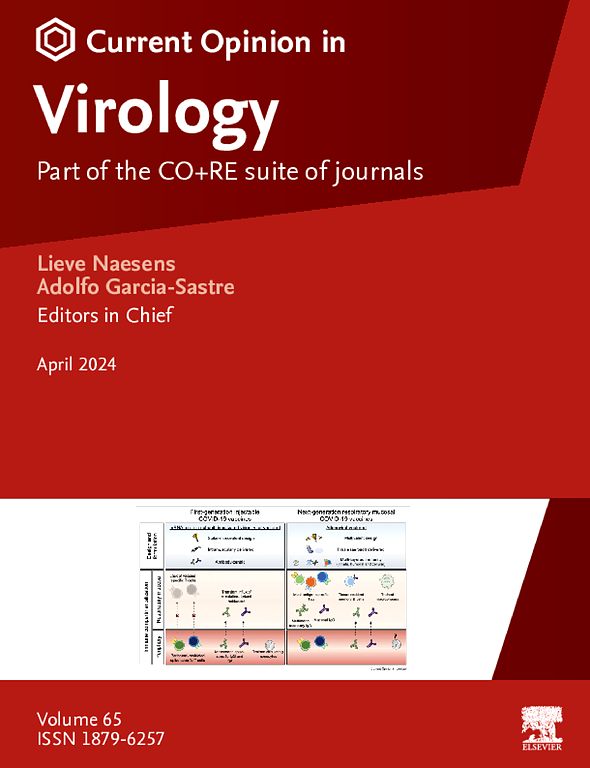Sequence variability of the K1 gene in Kaposi’s sarcoma-associated herpesvirus and its role in pathogenesis
IF 5.1
2区 医学
Q1 VIROLOGY
引用次数: 0
Abstract
Infectious pathogens account for approximately 13% of all human cancers globally, with oncogenic viruses constituting the majority. Among them, Kaposi’s sarcoma-associated herpesvirus (KSHV), a gammaherpesvirus, remains a persistent public health concern. Although KSHV is endemic in sub-Saharan Africa, where it drives high rates of pediatric and endemic Kaposi’s sarcoma (KS), AIDS-related KS remains a significant burden among immunocompromised individuals, especially in areas with limited access to long-term antiretroviral therapy. Additionally, KSHV is etiologically linked to primary effusion lymphoma and multicentric Castleman disease, both increasingly observed in transplant recipients and individuals undergoing long-term immunosuppressive therapy. Despite decades of research, no approved vaccine or curative treatment is currently available. Among the KSHV-encoded proteins, the K1 oncoprotein, encoded by the first open reading frame of the viral genome, exhibits exceptional sequence diversity and plays a critical role in viral pathogenesis. K1 activates key host signaling pathways involved in angiogenesis, cellular transformation, and survival. Importantly, genetic variation within K1, particularly in its variable regions, forms the basis for classifying KSHV into distinct genotypes that show different geographic distributions and may have divergent pathogenic potentials. In this review, we provide an updated overview of functions of K1, highlight genotype-specific oncogenic mechanisms, and examine how K1 sequence diversity may shape viral evolution, host interactions, and clinical outcomes.
卡波西氏肉瘤相关疱疹病毒K1基因序列变异及其在发病机制中的作用
感染性病原体约占全球所有人类癌症的13%,其中致癌病毒占大多数。其中,卡波西肉瘤相关疱疹病毒(KSHV),一种伽玛疱疹病毒,仍然是一个持续的公共卫生问题。尽管KSHV在撒哈拉以南非洲流行,在那里它导致儿童和地方性卡波西肉瘤(KS)的高发率,但艾滋病相关的KS仍然是免疫功能低下个体的重大负担,特别是在获得长期抗逆转录病毒治疗有限的地区。此外,KSHV在病因学上与原发性积液性淋巴瘤和多中心Castleman病有关,这两种疾病在移植受体和接受长期免疫抑制治疗的个体中越来越多地观察到。尽管经过数十年的研究,目前还没有获得批准的疫苗或治疗方法。在kshv编码的蛋白中,由病毒基因组第一个开放阅读框编码的K1癌蛋白具有特殊的序列多样性,在病毒的发病机制中起着关键作用。K1激活涉及血管生成、细胞转化和存活的关键宿主信号通路。重要的是,K1内的遗传变异,特别是其可变区域的遗传变异,构成了将KSHV分类为不同基因型的基础,这些基因型表现出不同的地理分布,可能具有不同的致病潜力。在这篇综述中,我们提供了K1功能的最新概述,重点介绍了基因型特异性致癌机制,并研究了K1序列多样性如何影响病毒进化、宿主相互作用和临床结果。
本文章由计算机程序翻译,如有差异,请以英文原文为准。
求助全文
约1分钟内获得全文
求助全文
来源期刊

Current opinion in virology
VIROLOGY-
CiteScore
11.80
自引率
5.10%
发文量
76
审稿时长
83 days
期刊介绍:
Current Opinion in Virology (COVIRO) is a systematic review journal that aims to provide specialists with a unique and educational platform to keep up to date with the expanding volume of information published in the field of virology. It publishes 6 issues per year covering the following 11 sections, each of which is reviewed once a year: Emerging viruses: interspecies transmission; Viral immunology; Viral pathogenesis; Preventive and therapeutic vaccines; Antiviral strategies; Virus structure and expression; Animal models for viral diseases; Engineering for viral resistance; Viruses and cancer; Virus vector interactions. There is also a section that changes every year to reflect hot topics in the field.
 求助内容:
求助内容: 应助结果提醒方式:
应助结果提醒方式:


